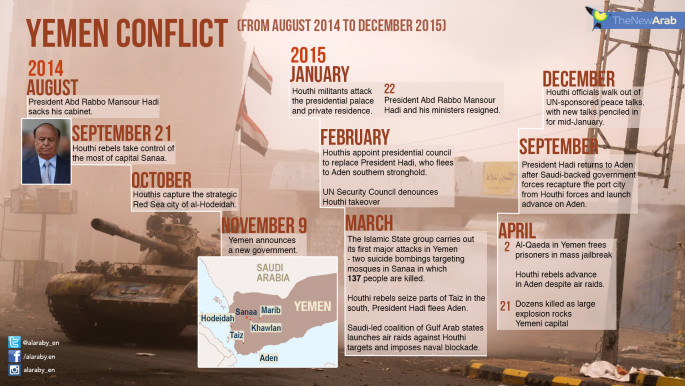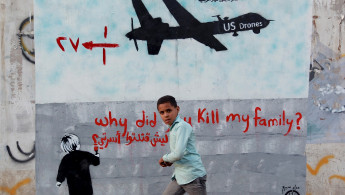Yemen peace talks continue as drone targets al-Qaeda fighters
Two suspected al-Qaeda militants have been killed in a drone strike - believed to be American - in Marib province, central Yemen.
The strike targeted a vehicle in Mazraat al-Aqel, south of Marib city, killing Nasr al-Hattam al-Qaifi and Hussein al-Aawash al-Muradi, local sources told The New Arab.
Witnesses said that a US drone fired two missiles at a car carrying two men in al-Manain district, south of Marib city.
"The car was totally destroyed and the men were killed instantly," residents told Reuters.
Washington has carried out a number of drone strikes in Yemen to decimate al-Qaeda in the Arabian Peninsula's leadership, since 2009.
After Yemen's civil war broke out between pro-government forces, and Houthi rebels backed by loyalists of the former president Ali Abdullah Saleh, al-Qaeda has gained control over swathes of eastern Yemen.
Since March, airstrikes targeting Islamist militants have increased in Yemen. This includes an attack in March which killed 14 suspected extremists in Abyan province, southern Yemen.
 |
On Saturday, government forces reached the entrance of Zinjibar as part of an offensive to liberate the town of AQAP |  |
Peace talks
On Saturday, government forces reached the entrance of Zinjibar as part of an offensive to liberate the town from al-Qaeda.
Government forces continued their advance into the al-Qaeda-held town as militants withdrew from their positions to the outskirts, local sources told The New Arab.
 |
| Click to enlarge |
Al-Qaeda has been in control of Zinjibar - capital of Abyan province and a strategic gateway to Aden - since late 2015.
Officials travelling to Saudi Arabia with US President Barack Obama this week told agencies they hoped a peace deal would allow for renewed focus on Yemen's extremist threat.
Meanwhile, Yemen's warring parties held a third day of direct peace talks in Kuwait on Saturday.
So far they have failed to agree on an agenda, but the fact that the rival parties are meeting is viewed as a positive step.
 |
Today's talks will tackle an agenda of four main points agreed earlier, wrote the head of the Houthi delegation Mohammed Abdul-Salam on Facebook. |  |
Abdul-Salam said the priority was to end the fighting that has killed more than 6,800 people and driven 2.8 million from their homes since Saudi-led Arab coalition launched air raids on Houthi targets in March 2015.
But he acknowledged that the truce was only accepted by between 70 and 80 percent of fighters, and violations had taken place on both sides.
The government delegation, meanwhile, is to press for the swift implementation of a package of confidence-building measures agreed in the last round of peace talks in Switzerland last December.
 |
The warring sides already carried out two prisoner exchanges last month. |  |
They include the release of prisoners and the lifting of blockades and other obstacles to the the delivery of relief supplies.
The warring sides already carried out two prisoner exchanges last month.
The hard-won negotiations in Kuwait opened on Thursday evening following the delayed arrival of representatives of the Houthi rebels and allied forces loyal to ousted president Ali Abdullah Saleh.





 Follow the Middle East's top stories in English at The New Arab on Google News
Follow the Middle East's top stories in English at The New Arab on Google News
![Netanyahu furiously denounced the ICC [Getty]](/sites/default/files/styles/image_330x185/public/2024-11/GettyImages-2169352575.jpg?h=199d8c1f&itok=-vRiruf5)
![Both Hamas and the Palestinian Authority welcomed the ICC arrest warrants [Getty]](/sites/default/files/styles/image_330x185/public/2024-11/GettyImages-2178351173.jpg?h=199d8c1f&itok=TV858iVg)
